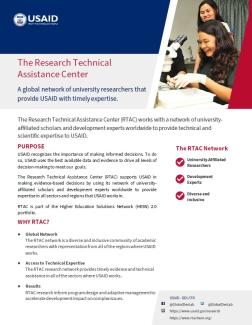The Research Technical Assistance Center (RTAC) works with a network of university affiliated scholars and development experts worldwide to provide technical and scientific expertise to USAID.
University-Affiliated Researchers
Development Experts
Diverse and Inclusive
Purpose
USAID recognizes the importance of making informed decisions. To do so, USAID uses the best available data and evidence to drive all levels of decision-making to meet our goals. The Research Technical Assistance Center (RTAC) supports USAID in making evidence-based decisions by using its network of university affiliated scholars and development experts worldwide to provide expertise in all sectors and regions that USAID works in. RTAC is part of the Higher Education Solutions Network (HESN) portfolio.
Why RTAC?
Global Network
The RTAC network is a diverse and inclusive community of academic researchers with representation from all of the regions where USAID works.
Access to Technical Expertise
The RTAC research network provides timely evidence and technical assistance in all of the sectors where USAID works.
Results
RTAC research informs program design and adaptive management to accelerate development impact on complex issues.
Benefits of RTAC
Research and Technical Assistance: In all sectors and regions that USAID works, the RTAC Network is available to provide:
- Applied research,
- Literature reviews,
- Secondary data analysis, or
- Technical assistance
Consultations and Expert Panels: RTAC can organize research-based expert panels, agenda-setting consultations, and convenings for USAID. The RTAC Network can also serve as panel experts and provide consultations for areas of technical importance to USAID, including for key Administrative priority areas.
Research Translation
Researcher Support: RTAC provides USAID with support in research translation and strategic communications services. It also produces research translation and communications products to disseminate USAID-funded research using accessible language. These products include:
- Fact sheets,
- Graphically-rich presentations,
- Policy briefs,
- Political economy analyses,
- Research-to-action plans,
- Research-to-action toolkits,
- Short videos, and
- Stakeholder analyses.
Training: RTAC can support, design or deliver specialized training for USAID staff, researchers, and implementing partners on cutting-edge development topics.
The Consortium
The RTAC Consortium is led by NORC at the University of Chicago.
Additional partners include:
- Arizona State University
- Centro de Investigación de la Universidad del Pacifico
- Davis Management Group
- Duke Sanford Center for International Development
- Forum One
- Institute of International Education (IIE)
- Notre Dame’s Pulte Institute for Global Development
- Population Reference Bureau
- ResilientAfrica Network at Makerere University (RAN)
- Harris School of Public Policy
- International Innovations Corps
- Pearson Institute for the Study and Resolution of Global Conflicts
- United Negro College Fund
- University of Chicago
- University of Illinois at Chicago
For more information, visit: rtachesn.org

